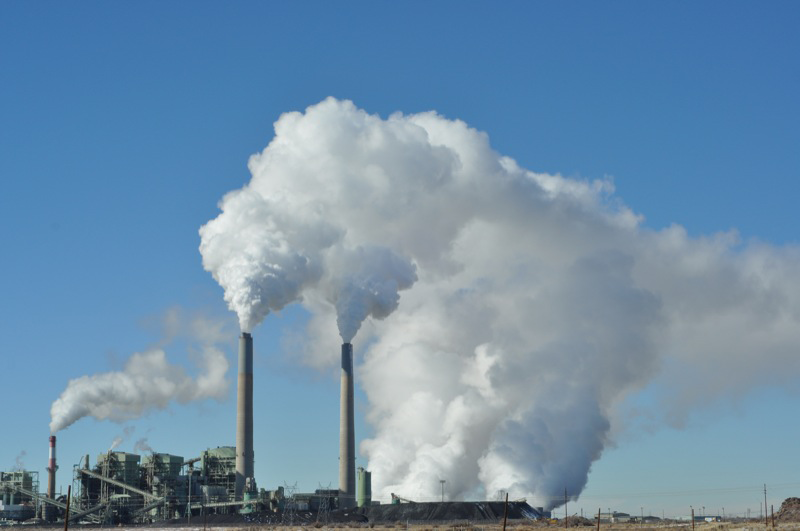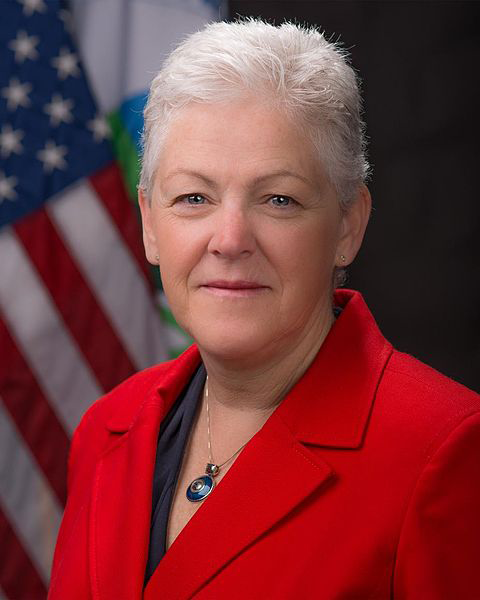Cleaning Up the Power Sector
Air Date: Week of June 19, 2015

Administrator McCarthy has been in charge of the clean power plan, designed to reduce CO2 emissions from the nation’s power plants. (Photo: Glennia, Flickr CC BY-NC 2.0)
EPA administrator Gina McCarthy joins host Steve Curwood to talk about her agency’s efforts to reign in CO2 emissions from the countries power plants, big trucks, gas fields, and airplanes. She says the EPA’s global warming efforts put the United States in a good position to be a leader at the Paris climate negotiations in the fall.
Transcript
CURWOOD: It’s Living on Earth, I’m Steve Curwood. One year ago this week, President Obama gave his most expansive speech on climate change at Georgetown University. And central to his plans are regulations that would rein in CO2 emissions from power plants. Well, the person in charge of making that happen is Gina McCarthy, Administrator of the US Environmental Protection Agency. Administrator McCarthy joins us now. Gina, welcome to the program.
MCCARTHY: It's great to be here with you, Steve. Thanks.
CURWOOD: So it's been, what, a year since the president announced his full-court press to tackle climate change and gas emissions, with power plants front and center, and you were tasked with carrying out that plan. How's it going one year out?
MCCARTHY: Well, it's been very busy, Steve, as you may know. We've done a tremendous amount of outreach. We've been working with states, utilities, business groups, environmental constituencies, communities, and it's going well, and we're planning to finalize it this summer, and we're excited about it.
CURWOOD: There are a lot of deadlines in this regulatory process, different phases and all that, so how on pace are you to meet those deadlines?
MCCARTHY: Well, there's a lot of work to be done, but we've been doing a lot of work all along. It's actually a combination of rules. It's one to look at how we can build new power plants in ways that are reducing carbon pollution as much as possible, and it's also going back and looking at the existing power plants and how we can work with states to provide a flexible, but practical plan, to over time reduce carbon pollution from our existing fleet. So there's been a lot of communications, a lot of work, a lot of analysis, but we ended up with more than 4 million comments. So we have a lot to work with, we have great information, we're pretty excited that we have learned a lot and will be able to finalize this rule in a way that will keep our lights on and keep the costs affordable, but also recognize that a low carbon future is where we need to head. It is inevitable, and if the US can really move forward and modernize our energy system, as we've been slowly doing it, and make that happen over time, that investments will follow and we'll capture those economic benefits.

The EPA is also working on rule-making to limit pollution from big trucks. (Photo: RaymondClarkeImages, Flickr CC BY-NC 2.0)
CURWOOD: Give me a high-level look at the legal logic of these policies. There's been a lot of pushback from industry and some of the coal producing states. In particular, a number of different interests have filed appeals, of course, to try to keep this from moving forward. What's the firmest ground that you stand on in this rulemaking, and where are you most at risk, do you think?
MCCARTHY: Well, I think the good thing about this rulemaking is that we’re operating it under the Clean Air Act, and EPA's been enormously successful in utilizing the Clean Air Act to provide significant public health protections, but also do it in a way that continued to allow our economy to grow. We're going to use that same system here, so we feel that we're on solid legal ground. The President knows that we have been granted the authority to do this rule. The Supreme Court has spoken three times to us to let us know that carbon pollution is something we need to think about under the Clean Air Act and so we need to make sure to get this done in a way that's legally solid, but also a way in which we can continue to work with states to bring the kind of protections that people are looking for. Steve, I don't pretend that this is going to be easy — it's been a challenge — but it's been a challenge that we and states and utilities have been working on. And we've done it with every pollution standard we've ever done and carbon is the one that's left, and we're going to do it well. We've proposed it in a way that's flexible and we’ll get this over the finish line.
CURWOOD: So what's it like to deal with Congress? Your predecessor joked that she deserved your own parking space up on Capitol Hill since the Republican-led House is constantly calling her up for hearings. And then, of course, the Hill was slow to confirm you and they still seem reluctant to rein in climate change gases. In fact, some want to defund your agency, they want to put you out of a job. What's it like to work with those folks?
MCCARTHY: Well, I do pretty well in my work with Congress. I respect that they have jobs to do, and I think the most important thing that I've tried to do is make sure that I engage with them on the actions that were taken in a way that assures them I'm looking at a full range of considerations. The President knows that action on climate change is an imperative, it's our moral responsibility, as well as an opportunity to turn a challenge into a real economic opportunity for this country. So as long as I can continue to go up there and defend rules and decisions that I feel are solid under the law, as well as provide American families clean air to breathe, good places to live, clean water and now a safer future, I'm a happy camper, and I'll keep going up there any time they offer and the conversations will continue, I'm sure.
CURWOOD: Now, we noticed that your agency has announced a series of other initiatives aimed at curbing greenhouse gas emissions. Talk to me a bit about the rules regarding big trucks and airplanes.

The EPA also plans to tackle emissions from airplanes. (Photo: caribb, Flickr CC BY-NC 2.0)
MCCARTHY: Yeah, the big trucks — we call them heavy-duty vehicles — that is some rulemaking that we are actually soon to be announcing as a proposal. I'm pretty excited about it, because these trucks produce a lot of emissions and a lot of carbon. And so there's real opportunities for reducing carbon pollution, but doing it in a way where we're delivering much more fuel-efficient vehicles. So if we are transporting a lot of products on the road in trucks, we can look forward to a future where our customers will pay less for those products because we'll be using less energy to deliver them and save lots of money. We're looking at methane emissions upstream in the oil and gas development sector so that we can figure out how to capture those, because it's tremendous opportunity for more cost-effective operations. Every time you leak methane, you're leaking a product. So there's great opportunities there. And I think, you know, we recently put out an advance notice of proposed making and a proposed endangerment finding on aircrafts, on large aircraft. That's an opportunity for us to work in an international context, to take a look at what the world thinks about reducing carbon pollution and what the U.S. obligation would be under those international agreements, if and when they come forward.
CURWOOD: You don't supposed there will be any flap over that, do you?
MCCARTHY: Well, you know, there's always been EPA flak over just about everything we've done, but, honestly, we've proven skeptics wrong each and every time. And we're going to keep doing that because we're going to keep our public-health and environment protection mission alive here at this agency. And I'm going to be facing up to the challenges in making decisions based on science facts and based on our ability to keep the economy moving forward, and we think will do just fine.
CURWOOD: So, come the late fall, early winter, big climate negotiation session in Paris. But first let me ask you, what's your take on what Pope Francis is saying about the necessity to address climate disruption?
MCCARTHY: Well, there's a lot of alignment between what the Pope is saying and what the President has announced when he put out his climate action plan a few years ago, and that is that we have a moral responsibility to protect our natural resources. Most of us are very excited about the Pope's encyclical. We have been hearing from and working with folks of all faiths who are concerned about climate change, concerned about what it does for God's creation, and working with us to identify opportunities to talk to people of all faiths about what they can do as individuals and what the President hopes to do in this country to drive domestic carbon pollution down. But really, equally importantly, is to use that as an opportunity to really garner support for the kind of global action that we need to take. And in the meantime the working really hard on adaptation with local communities and states, to make sure that California has all the tools that we can help it with to get over the droughts, that Texas and its flooding can help protect themselves when the next flood comes, and looking at the wildfires and all other things that we need to do, recognizing that the climate's already changing, but certainly well aware that mitigation can stop that change from becoming even more intolerable than it is today.

Gina McCarthy (Photo: Environmental Protection Agency)
CURWOOD: What has your role been with the inter-agency task force in advance of the Paris negotiations?
MCCARTHY: Well, we work pretty directly with the Secretary of State, Secretary Kerry, and with his climate envoy Todd Stern on their international discussions. But, frankly, a lot of the emphasis that people are coming to me to talk about has to do with the work that EPA is doing. They see it as really game changing. When EPA stepped forward and announced our clean power plan as part of the President's climate action plan, it really did change the international discussions. We have visitors from all over the world coming in and asking what we're doing, is this really happening, can you get this done. And it's wonderful to be able to meet with them and to see that they're paying attention to these issues, they're getting reengaged and the international community is really sitting up and taking notice. So what the President wanted to do is actually happening. He wanted to show that if the US takes strong domestic action, we can engage other big players like China, which we have engaged. And in Paris we can have an entirely different discussion, and one that we hope will lead to an aggressive strategy moving forward.
CURWOOD: Administrator McCarthy, there's a year and a half left for the Obama administration at this point. What do you hope to achieve in that time, and how do you want people to remember this administration when it comes to the environment?
MCCARTHY: Well, when it comes to the environment we have a lot of work to do. Climate is clearly number one, it's highest on the President’s agenda and mine as well. So we're going to deliver on all of these efforts moving forward, but we have more to do than that. We have an ozone standard that we'll be looking at, we did a new clean water rule that's attempting to provide clarity on what waters need to be protected federally and at state levels. And we're going to keep moving forward with a range of current challenges that we’re facing and try to leave this agency with the full knowledge that we've done the best we can to follow the science and the law, and to ask folks to consider and take reasonable steps, as we have always done. And I'm personally hoping that I leave this agency better positioned for the future than it was when I came in here.
CURWOOD: Gina McCarthy is the Administrator of the United States Environmental Protection Agency. Thanks so much for taking the time with us, Administrator.
MCCARTHY: Great to be here, Steve. Thanks.
Links
Read more about the Administrator of the EPA
Read an article Ms. McCarthy wrote on the Economics of Fighting Climate Change
“Proposed Rule for Big Trucks Aims at Cutting Fuel Emissions”
Living on Earth wants to hear from you!
Living on Earth
62 Calef Highway, Suite 212
Lee, NH 03861
Telephone: 617-287-4121
E-mail: comments@loe.org
Newsletter [Click here]
Donate to Living on Earth!
Living on Earth is an independent media program and relies entirely on contributions from listeners and institutions supporting public service. Please donate now to preserve an independent environmental voice.
NewsletterLiving on Earth offers a weekly delivery of the show's rundown to your mailbox. Sign up for our newsletter today!
 Sailors For The Sea: Be the change you want to sea.
Sailors For The Sea: Be the change you want to sea.
 The Grantham Foundation for the Protection of the Environment: Committed to protecting and improving the health of the global environment.
The Grantham Foundation for the Protection of the Environment: Committed to protecting and improving the health of the global environment.
 Contribute to Living on Earth and receive, as our gift to you, an archival print of one of Mark Seth Lender's extraordinary wildlife photographs. Follow the link to see Mark's current collection of photographs.
Contribute to Living on Earth and receive, as our gift to you, an archival print of one of Mark Seth Lender's extraordinary wildlife photographs. Follow the link to see Mark's current collection of photographs.
 Buy a signed copy of Mark Seth Lender's book Smeagull the Seagull & support Living on Earth
Buy a signed copy of Mark Seth Lender's book Smeagull the Seagull & support Living on Earth

